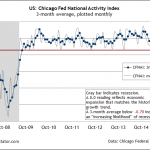Grant Williams, publisher of the economic blog Things That Make You Go Hmmm and principal of Real Vision TV, returns to the podcast this week to discuss his expectation of a return of volatility to the markets.
Grant warns that over the past seven years, the various financial markets around the globe have melded into a single world market dominated by trading algorithms and the central banks. This new system only knows how to operate effectively in one direction: Up.
Grant is very concerned that a return of volatility will act as a wrench tossed into the gears, quickly throwing the world financial system into panic.
I’ve spent a lot of time thinking about the incredible amount of counterintuitive moves that we see in markets. It’s all inextricability linked to the rise of computer trading
Once you get momentum, markets start going up based on the back of algorithms. Then we start to see the day traders coming on the back of it, and everyone starts to gain confidence.
Markets are global now. There really is only one equity market around the world, certainly when they’re going up. We’ll see when markets turn and start to go down. And I think that’s definitely something we need to talk about because I suspect it will be very, very different market action when this trend turns.
So we really do live in an entirely new world. I don’t think we’ve had a bidirectional market through which we can understand what these things do. The markets have been drifting higher, for essentially the entire period of time that these machines have gained ascendency.
And so we as humans are trying to figure out what this means, trying to figure out how it works. And we don’t know because we only know which way it works in one direction. When we start to see cold-hearted, trend-following algorithms determine that the path is down, when you really are going to need human beings.
I’ve talked about this a lot: When markets are going up, I can guarantee you there’s an offer. At any price at any hour of the day or night, someone will show you an offer, and it may be significantly higher than the last trade, but there will be an offer. But when markets turn and go down, people forget that oftentimes there are no bids.
People forget, particularly central bankers, that every now and again, the markets tend to punch central bankers in the face. And the last time we really saw this, I think, goes back to the day that Soros forced the pound of the European Exchange Rate mechanism back in the early 90’s.
And this was something that Soros bet on. The central bankers had said this is solid. We’re not going to do anything. The markets took the other side of that when they sensed weakness. And within a day, the chancellor of the UK was forced very sheepishly to backtrack in front of the TV cameras.
That was the last time that these guys got punched really hard, and it’s almost twenty-five years ago. So I think memories are short. I think confidence is high, both on their part and in them on the part of the markets.
But we are, it seems, reaching a point of newly introduced volatility, and it really only takes confidence on the part of the market in central banks to wane for their powers to be weakened considerably. Because without that tailwind of people believing in what they’re doing and believing that they will be successful, they then have to prove it.
And I think you and I both understand that really markets are and will always be bigger than a group of eight or nine or ten guys around the world with a plan and a desire. And if they are forced into proving their strength and proving what they can and can’t do, I think they are very quickly going to find out that there’s an awful lot they can’t do. And it could get very, very ugly.













Leave A Comment